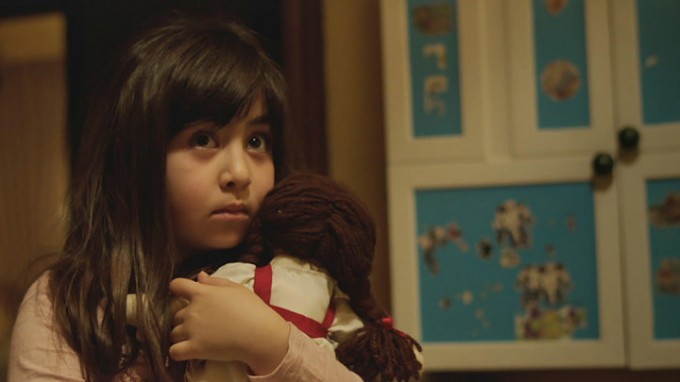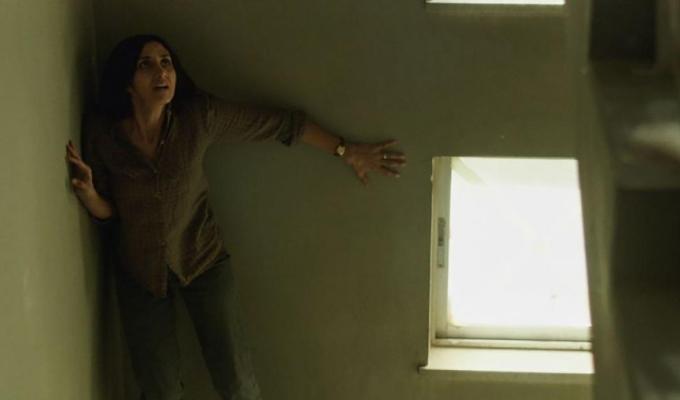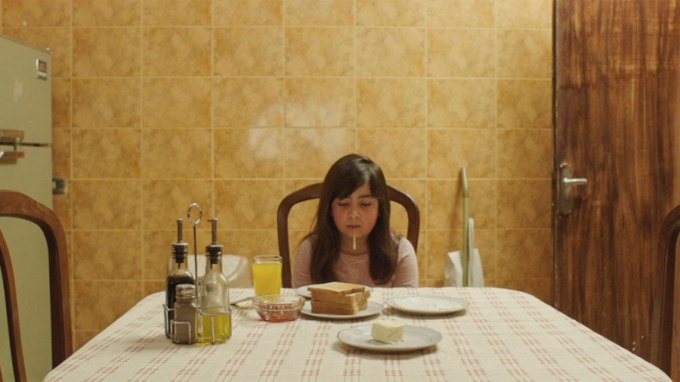
A little bit of a confession before I start this review: I am not overly familiar with Iranian cinema. Apart from films by Abbas Kiarostami and Asghar Farahdi, I haven’t seen a lot of films from Iran, especially genre films.
However, I saw a film called A Girl Walks Home Alone At Night, a Persian-language film by Ana Lily Amirpour that was declared “the first Iranian vampire western”. It was a fantastic film with brilliant style, original storytelling and a great soundtrack – and it was because of that film, I wanted more genre offerings from Iran and thanks to Sydney Film Fest 2016, I got the opportunity to watch the much-buzzed film of Sundance 2016, Under the Shadow.
Now does the film live up to the acclaim or will it be just an over-hyped piece that belongs in the dark abyss?

Set in 1988, Shideh (Narges Rashidi) is a Westernised and modern woman (as evident with her owning a VCR, with an amusing Jane Fonda workout tape) in post-revolutionary Iran, whose past involving controversial political decisions have disqualified her from completing a degree in medicine.
When her doctor husband (Bobby Naderi) is ordered to help in the long-running war with Iraq, much to the anger and resentment of Shideh, she is left to care for their daughter Dorsa (Avin Manshadi). Urged to leave by her husband to leave and live with his parents in the north, Shideh refuses. As bombs fall on the capital and residents begin to flee, a malevolent djinn (genie) enters their home.
From her downstairs neighbor (Aram Ghasemy), a superstitious woman of old-fashioned values, Shideh learns about the djinn, spirits carried on the wind to places where fear and anxiety have paved their way. From then on, it is pure terror that strikes Shideh when Dorsa announces the djinn has promised to find her a better mother.

Watching this film, I noticed quite a few similarities between this and the Australian film, The Babadook. They both are mostly set in the house; they are both involving mothers struggling in their place in life; they both have menacing antagonists that might be imagined and there is a sense of a metaphor beneath its malevolent surface. Fortunately, Under the Shadow is never seen as derivative due to Babak Anvari‘s wonderfully assured direction.
Despite using the usual ways to provoke thrills and scares, Anvari does it with precision and style and it is all done from the most minuscule actions and events. There’s an amusing jump scare near the beginning of the film that ends with a usage of a toaster, that had the audience laughing wholeheartedly. As well as one involving a dream sequence that would be a big no-no in my book, but it is done with such skill, it still got to me, as well as the audience.
The film also gets fantastic mileage from the director’s less-is-more approach; similar to the horrors of Jaws. We do get a glimpse of the djinn, and I do mean a glimpse, but it is a haunting one and it is still tattooed in my brain as I write this review. As much as a threat the djinn is, the other threat to the characters is the world the characters live in. The oppression of women in the post-war Iran sends Shideh in such a rough ride that the djinn almost seems superfluous. There’s a scene in the film where Shideh runs away from the horrific occurrences from the house barefoot, and she is caught by the police and arrested due to her not wearing her hijab. It is a scene like this that Anvari balances real and imagined threats towards the characters that make the film such a standout, thanks to the great use of social commentary and its positive melding into the storytelling.

That said, none of the scares and thematic material would matter much if the actors were not up to par and, thankfully, they are all up to the task. Narges Rashidi gives a great performance as she convincingly plays the struggle Shideh goes through, whether it is the social obstacles that threaten to shoehorn her place in the world as well as the terrors in the house.
Whereas Avin Manshadi is captivating as the daughter, Dorsa, as she comes off as annoying as first, but Anvari‘s direction and storytelling warps our perception of her to the point where all of her actions throughout the film makes perfect sense, making the emotional involvement of the film payoff spectacularly in the climax. The supporting cast are all fine in their parts, but it is the mother and daughter that helps make the film as scary and frightening as it is.
As for flaws, and there really isn’t that much, the lighting during the horror scenes could be a bit brighter for better visibility and the ending can be a bit abrupt in its resolution, but it does end well in its ambiguity. Under the Shadow shows that horror is still alive and well in cinema and not only do I hope that Iran does more genre films, I really hope it brings Iranian cinema out of the shadows and into the mainstream.

Review Score: FOUR STARS (OUT OF FIVE)
Under the Shadow screened at this year’s Sydney Film Festival
———-
